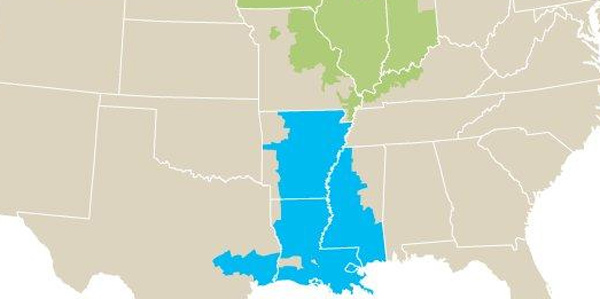By Amanda Durish Cook
FERC is seeking more specifics on MISO’s plan to improve its procurement of reserves in MISO South, asking the RTO in a June 5 deficiency letter how it will impact the contractual transfer limit on flows crossing SPP transmission (ER18-1464).
MISO proposed in late April to apply its existing reserve procurement enhancements — first rolled out in 2011 in MISO Midwest — to the sub-regional constraint between Midwest and South.
The RTO’s reserve procurement enhancement models the effects of transmission constraints by accounting for the deliverability of reserves deployed from market-cleared resources and adding a marginal cost of delivering reserves to the zonal reserve market clearing price. The change would also subject sub-regional capacity commitments in South and binding flows in the Midwest-to-South direction on the sub-regional limit to the Independent Market Monitor’s mitigation authority.
MISO’s reserve procurement practices currently only apply to physical transmission constraints, not contractual constraints like the sub-regional limit with SPP.
MISO acknowledged in its filing that a new product providing capacity within 30 minutes would be most effective in solving South’s lack of fast-start resources and reserve scarcity but said its April proposal was a more near-term solution and asked that it become effective June 27. The RTO said it currently makes out-of-market commitments to meet South capacity requirements that result in high revenue sufficiency guarantee (RSG) costs.
In stakeholder meetings, MISO staff have said that a short-term capacity reserve would be especially helpful in South, which has less than 500 MW of capacity available within 30 minutes. The West of the Atchafalaya Basin load pocket has 100 MW of 30-minute reserves, while Amite South has none. (See “Short-term Capacity Product is a Go, MISO Concludes,” MISO Market Subcommittee Briefs: April 12, 2018.)
In an affidavit accompanying the filing and supporting expanded mitigation, Monitor David Patton said that South is more susceptible to market power than Midwest because South has more pivotal suppliers.
But FERC said MISO’s reserve plan only promised to abide by “appropriate limits” of its sub-regional transmission and did not explicitly reference the maximum contractual limits set forth in the MISO-SPP transmission use settlement agreement struck in 2015. The commission said it was “unclear” if MISO intended to abide by the established megawatt limits in the proposal. The commission also asked MISO to explain its generation shift factors — especially when the MISO-SPP contract path binds on flows into South — and to explain its process for updating shift factors.
FERC issued the deficiency letter after regulators from Texas, Arkansas, Louisiana, Mississippi and New Orleans filed a limited protest May 24. The regulators asked that MISO specify that its reserves procurement modeling will use a 3,000-MW limit on north-south flows and 2,500-MW cap on south-north flows, reflecting the regional directional transfer limits in the MISO-SPP joint operating agreement settlement.
The commission required MISO to list the number of hours by month that the sub-regional constraint bound in each direction during 2016 and 2017. It also instructed MISO to estimate the amount of RSG payments that would be affected had the changes been active in 2016. MISO had said that its proposal to extend mitigation would reduce RSG payments.
Finally, FERC asked MISO whether it or Patton could produce “any studies or analyses regarding the expected increase in the frequency with which the … constraint will bind into MISO South once MISO applies the reserve procurement enhancement provisions.”
The commission gave MISO three weeks to respond to its questions.





